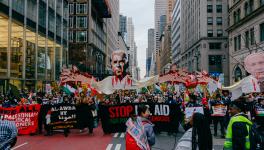COVID-19: Private Sector Administered Only 1.6 Crore Doses out of Total 20.8 Crore, Report Says
The private sector – given a 25% quota by the Central Government's vaccination policy – has only administered 1.6 crore anti-COVID-19 vaccine doses out of a total 20.8 crore doses in all. The data, compiled until Sunday morning further revealed that of the 1.5 crore-odd doses administered by the private sector, a large part was in urban pockets in metropolitan cities.
According to a report in The Times of India, data till May 30 showed that the private sector has barely managed to record 7.5 per cent of the total doses administered (20.8 crores) with that number only rising above 10% in seven states and union territories and in over 80 out of 750-odd districts in India. The report added that 25 districts – largely urban pockets – accounted for 54% of the 1.6 crore doses administered by private players across the country.
The report added that in almost 80% of all districts the public sector had administered over 95% of the total COVID-19 vaccine doses as of May 30, according to data scraped by the newspaper from the CoWIN portal for about 1.6 lakh vaccination centres since January 16, the day the vaccination exercise began.
It mentioned that in rural areas and north-east India – about 50% of total districts – the private sector had lent a hand by vaccinating less that one per cent of the population.
The largest number of doses given out by the private sector are from Delhi, Hyderabad, Mumbai, Kolkata, Chennai and Bengaluru, with the BBMP recording 44% vaccination, the highest number from the private sector. In union territories and states Delhi had 21% vaccination from the private sector, followed by Chandigarh at 15%, Telangana at 14%, Maharashtra at 13% and Tamil Nadu and Karnataka at 12%.
The disparity is quite evident. About half the districts in the country have seen less that one per cent vaccination by private players, making the Supreme Court's recent observations pertinent.
The court said that it was likely that forcing state governments to negotiate with vaccine manufacturers would be detrimental to the vaccine drive for those between 18 and 44 years of age. “The social strata of this age group also comprises persons who are bahujans or belong to other underprivileged and marginalised groups, like many in the other population age groups. They may not have the ability to pay”, the court highlighted.
“Whether or not essential vaccines will be made available to them will depend upon the decision of each state government, based on its own finances, on whether or not the vaccine should be made available free or should be subsidised and if so, to what extent. This will create disparity across the nation,” the court said. The court told the Centre that vaccinations being provided to citizens constituted a valuable public good.
“Discrimination cannot be made between different classes of citizens who are similarly circumstanced on the ground that while the Central government will carry the burden of providing free vaccines for the 45 years and above population, the state governments will discharge the responsibility of the 18 to 44 age group on such commercial terms as they may negotiate”, it said.
Get the latest reports & analysis with people's perspective on Protests, movements & deep analytical videos, discussions of the current affairs in your Telegram app. Subscribe to NewsClick's Telegram channel & get Real-Time updates on stories, as they get published on our website.
























